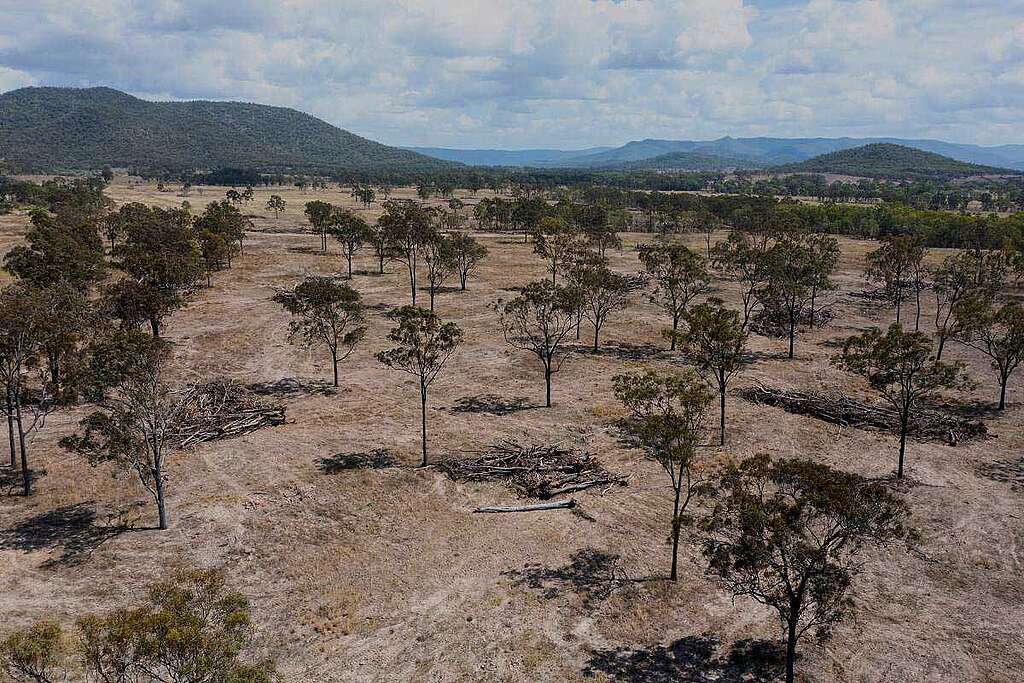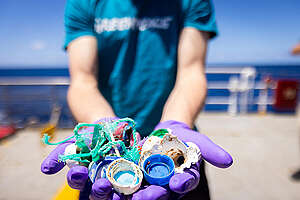Summary
Australia is a global deforestation hotspot, driven primarily by the beef industry. Every two minutes, a large football field-sized area of forest and bushland is bulldozed, putting Australia alongside places like the Amazon, Congo and Borneo on the scale of destruction. This is killing tens of millions of native animals each year, including koalas, while harming the land, polluting rivers, making climate change worse and damaging the Great Barrier Reef.
Australia’s largest beef buyers – the retailing and processing companies – have the ability to fix this problem by ensuring their supply chains are conversion and deforestation-free (meaning no destruction of all natural ecosystems) by 2025. Doing so would demonstrate strong environmental leadership and align with major international corporate sustainability target-setting initiatives such as the Science-Based Target Initiative (SBTi) and Science-Based Targets for Nature (SBTN). With the European Union implementing a tough new deforestation-free export and import law this year, this would also align with key international markets.
In this report we assess how the commitments and implementation efforts of ten of Australia’s largest beef buyers – including McDonald’s, Hungry Jack’s, Coles and Woolworths – stack up against a conversion- and deforestation-free target by 2025.
All of the companies assessed failed, with none scoring above 50%.
While a small handful of companies had some form of deforestation-free commitment, none clearly articulated that their policy covers important regenerated forest. In addition, no companies were able to provide clear evidence of implementing their commitments. Crucially, this is due to a lack of full tracking of supply chains down to the property level where deforestation is occurring. Given deforestation has been a persistent issue in Australian beef supply chains for decades, this reflects very poorly on the environmental credentials of these companies.
The beef industry must address the destruction of forests and natural ecosystems happening on their watch. There must be no hiding behind greenwashing, minimalist targets and watered-down definitions. Instead the industry could and should be a leader in positive environmental change. This centres on setting a target and a clear implementation plan of conversion and deforestation-free by 2025, using global best-practice definitions set out by the Accountability Framework Initiative (AFI).

Discover the beef industry’s impact on Australian forests & wildlife
Email the CEOsView our deforestation scorecard and full methodology below.
Major beef buyers deforestation scorecard
| Deforestation-free Commitment | Plan to Implement | Total(out of 10) | |
| Aldi | 4.50 / 5 | 0.25 / 5 | 4.75 |
| Woolworths | 3.25 / 5 | 0.75 / 5 | 4 |
| McDonalds | 2.50 / 5 | 1 / 5 | 3.5 |
| JBS | 1 / 5 | 1.5 / 5 | 2.5 |
| Tyson | 1.5 / 5 | 0.25 / 5 | 1.75 |
| Coles | 0.25 / 5 | 0.50 / 5 | 0.75 |
| Hungry Jacks | 0.5 / 5 | 0 / 5 | 0.5 |
| Teys | 0.5 / 5 | 0 / 5 | 0.5 |
| Metcash/IGA | 0 / 5 | 0.25 / 5 | 0.25 |
| ComGroup | 0 / 5 | 0 / 5 | 0 |
Methodology
| Criteria | Detail | Weight | Considerations |
| Commitment. Have they made a strong commitment? | 1.1. Commitment to protect forests (deforestation-free)? | 2 | 2 points only if AFI-aligned and there is explicit commitment to protect regenerated or regenerating forests at least 15 years of age, including on land where livestock is currently present; 1.5 points if explicitly AFI-aligned; 1 point if commitment only covers “primary” and/or HCV forest; 0.5 if mentions ending deforestation. |
| 1.2. Commitment to protect all natural ecosystems (conversion-free)? | 1 | 1 point only if conversion-free stated; 0 points if not | |
| 1.3. Clear timeline of full implementation by at least 2025, with a cut-off date of December 2020? | 1 | 1 point only if targets are aligned; 0.5 points if partially aligned or the targets are for a minimalist commitment (i.e. only “primary forest”); 0 points if no target set or beyond 2030. | |
| 1.4. commitment covers beef plus all other relevant primary commodities in the supply chain? | 1 | 1 point only if all commodities relevant included in commitment; 0.5 if just beef. | |
| 5 | |||
| Implementation. Does it appear they will meet their commitment? | 2.1. Clear and transparent sourcing policy and traceability system in place that is able to identify conversion and deforestation in the supply chain at a property level? | 2 | 2 points only if able to demonstrate full traceability to property-level across the entire supply chain; 1 point if able to demonstrate traceability in deforestation hotspots at property-level; 0.5 points if only able to demonstrate this occurs at a regional or sub-regional level. |
| 2.2. Active monitoring of conversion and deforestation at a property level, including using Queensland’s SLATS data in that state? | 1 | 1 point only if able to demonstrate this occurs at a property level; 0.25 point if only able to demonstrate this occurs at a regional or sub-regional level. | |
| 2.3. Able to disclose full exposure to conversion and deforestation-risk commodities? | 1 | 1 point only if disclosure is public, accurate and transparent; 0 point if public statements are potentially misleading (e.g. claiming to be “deforestation-free” when this does not include regenerated forest or other threatened species habitat) or no attempt has been made. | |
| 2.4. Actively working with producers and processors that need assistance to stop conversion and deforestation and ending relations with those that don’t want to stop? | 1 | 1 point if actively addressing deforestation and conversion and ending relations with some. 0.25 if mentioning working with suppliers to address deforestation in their supply chain. | |
| 5 | |||
| 10 |

